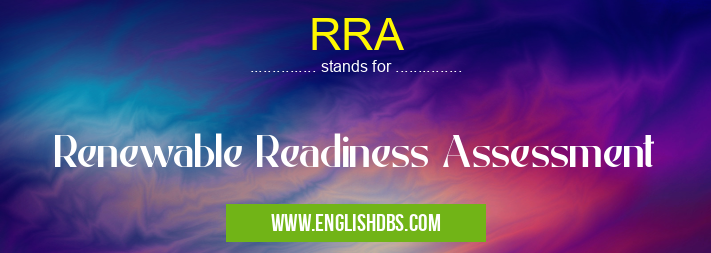What does RRA mean in UNCLASSIFIED
Renewable Readiness Assessment (RRA) is a comprehensive evaluation process that assesses the preparedness of a utility or region for the integration of renewable energy sources into its electricity grid. The purpose of an RRA is to identify potential challenges and opportunities associated with increasing the penetration of renewable energy while maintaining grid reliability, affordability, and resilience.

RRA meaning in Unclassified in Miscellaneous
RRA mostly used in an acronym Unclassified in Category Miscellaneous that means Renewable Readiness Assessment
Shorthand: RRA,
Full Form: Renewable Readiness Assessment
For more information of "Renewable Readiness Assessment", see the section below.
Key Components of an RRA
An RRA typically includes the following key components:
- Baseline Assessment: Establishment of a baseline understanding of the current state of the grid, including its generation, transmission, and distribution infrastructure.
- Renewable Energy Potential Assessment: Evaluation of the potential for renewable energy development within the region, including solar, wind, biomass, and other sources.
- Grid Integration Analysis: Assessment of the technical and operational implications of integrating renewable energy sources into the grid, including variability, intermittency, and grid stability.
- Economic and Regulatory Analysis: Examination of the financial and regulatory factors that influence renewable energy development and integration.
- Stakeholder Engagement: Involvement of key stakeholders, including utilities, government agencies, industry representatives, and consumer groups, to ensure a collaborative and inclusive assessment process.
Benefits of an RRA
Conducting an RRA offers several benefits, including:
- Improved Planning: Identification of challenges and opportunities for renewable energy integration, enabling informed decision-making.
- Enhanced Grid Reliability: Assessment of potential impacts on grid stability and the development of mitigation strategies.
- Cost Optimization: Evaluation of cost-effective strategies for integrating renewable energy while maintaining affordability.
- Increased Transparency: Engagement with stakeholders promotes understanding and fosters collaboration.
- Support for Policy Development: Provision of data and analysis to inform policy decisions related to renewable energy development and integration.
Essential Questions and Answers on Renewable Readiness Assessment in "MISCELLANEOUS»UNFILED"
What is the Renewable Readiness Assessment (RRA)?
The RRA is a voluntary, confidential assessment tool that helps utilities evaluate their readiness to integrate renewable energy sources into their operations. It provides a comprehensive review of key areas, including:
- Resource planning
- Grid integration
- Market participation
- Customer engagement
What are the benefits of using the RRA?
The RRA offers several key benefits, including:
- Identification of strengths and weaknesses in renewable energy integration
- Development of a roadmap for addressing gaps and improving readiness
- Improved understanding of industry best practices and emerging technologies
- Enhanced stakeholder engagement and communication
Who can participate in the RRA?
The RRA is open to all utilities, regardless of their size or level of renewable energy experience. It is particularly valuable for utilities that are looking to increase their use of renewable energy or are facing challenges in integrating renewables into their operations.
How long does the RRA process take?
The RRA process typically takes 6-12 months to complete. The timeline can vary depending on the size and complexity of the utility and the availability of resources.
What is the cost of the RRA?
The cost of the RRA varies depending on the scope of the assessment and the size of the utility. Utilities should contact the RRA administrator for a cost estimate.
How can I get started with the RRA?
To get started with the RRA, utilities should contact the RRA administrator. The administrator will provide guidance on the assessment process and help determine the appropriate scope and timeline for the assessment.
Final Words: RRA is a critical tool for utilities and regions seeking to increase their reliance on renewable energy sources. By comprehensively assessing the preparedness of the electricity grid, RRAs identify potential challenges and opportunities, facilitate informed decision-making, and ultimately support the successful integration of renewable energy while ensuring grid reliability, affordability, and resilience.
